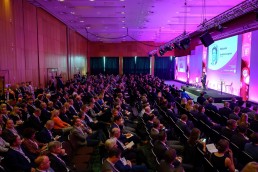Hospitality is a human powered industry, driven by connections, emotions and interactions. Never has there been a more vital moment to join together and share leadership in thought and creativity, hope for the future and celebration of the collective sense of community that this crisis has created. The AHC Reimagined was the first of its kind: a hybrid, with live interaction and a studio setting.
The event was hosted – in person – by Alexi Khajavi, Managing Director EMEA and Chair of Hospitality & Travel Group, Questex Hospitality and Jonathan Langston, Chair, The AHC and IHIF advisory boards.
The opening keynote saw IHG CEO Keith Barr share his thoughts on hospitality and planning for the future with former BBC Chief Correspondent Gavin Hewitt. The sector will see consolidation “over time”, Barr said, with “small brand companies acquired by the larger companies”.
Commenting on the wider sector, he noted: “We’re on the path to recovery but with a long road ahead. We’ve bounced off the lows. We have seen travel beginning to come back and we expect to see that continue – we were seeing a recovery of occupancy and we’ve plateaued right now as an industry. We’re in a muted response in terms of growth.”
Barr had a reassuring message for the delegates, adding: “In China people are going to the malls and shopping, our resorts are having record years in terms of occupancy. It shows you that the demand for travel is there when it is safe to do so, that’s what the future holds for all of us. The US has come off the lows – the highest occupancy we had this year was the Labor Day weekend, where we had around 69% occupancy. It has recovered better than much of Asia and Europe, because there are fewer restrictions. China is leading, US is second and then Europe is behind.”
Barr closed with a warning about the need for the sector to have a louder voice, telling attendees: “My concern is that governments don’t understand the importance of travel and hotels in terms of jobs. Governments have to support this industry, if they don’t get behind this you will see small businesses fall over and that’s not good for society.”
The second session featured John Ashcroft, founder, CEO, author, The Saturday Economist, who foresaw an enthusiastic bounce back. He began: “It’s always a V-shaped recovery – it’s the shape of recovery, but it won’t go back to normal for everyone. We have seen an incredible shock to hotels and tourism. Tourism fell around 40% in the final month of the first quarter. Passenger numbers in Q2 dropped by 99%. In Q3 we think there has been a rally, but we expect some acceleration in the final quarter of the year and by the time we get to Easter we should see a huge surge in growth.
“If everybody behaves well, the students will be home for Christmas. If everybody behaves well we should have more than six around the table. But the final question is what will happen to unemployment? Rishi Sunak has made it clear that he cannot save every job. The furlough scheme comes to an end at the end of October. Around 10% of the workforce is still on the scheme and they could be added to the ranks of the unemployed. That’s why most economists were pushing for one extension of the furlough scheme into next year.
“The good news is economies do return to normality. Some sectors may lag, but economies do return to the mean. There will be a setback this year but the economy will get better in 2021, it is important to look ahead. As we get into Spring next year the world will look a lot brighter.”
Checking the data was Thomas Emanuel, Director, STR who stated: “At STR we believe that long term travel will recover. People’s desire to travel won’t go away. The travel ecosystem has been shaken to its core and it will take years for flight numbers to return. People want to meet, network and learn and once we can meet again there will be more demand.
“We expect rates to come back to 2019 levels by 2024. We need vaccinations, we need cures, we need treatments before we see a return to travel. The UK government were encouraging us to go back to the office, now they are telling us to stay at home. There have been bumps in the road.
“Pickup is now positive. Booking windows are now short – people aren’t making longterm plans. When we look at existing levels of occupancy, we believe that they are going to move back by 5% to 10% in the coming weeks, there is not the pickup to sustain more. Business on the books is a half or a third behind what we would expect to it to be.”
There was further data from Michael Grove, Managing Director, EMEA, HotStats, who observed: “The provinces are outperforming the cities around the world. Government payroll support has been a good thing for the industry. Last year is of little relevance right now, context is key in understanding performance – don’t drive in the dark without your lights on.”
Up next was a panel chaired by Pride of Britain Hotels CEO Peter Hancock, who debated the new normal with Deirdre Wells OBE, CEO, Visit Kent and Hubert Viriot, CEO, Yotel.
The need for a sound testing regime in the UK was repeated on a number of panels, including this one. Viriot said: “It’s hard to pinpoint a date for London recovery. We need testing, testing, testing to ensure that customers are confident. We have a hotel in Istanbul where testing is required on arrival at the airport and occupancy has recovered. Here, we’re pretty much locked down from the rest of the world.”
Wells saw a chance for a shift in the corporate market, commenting: “The world of conference and events is changing. Is this the opportunity for smaller, rural venues? The sector is agile, innovative, entrepreneurial, but we have to be flexible. We will have to live with the virus, so being practical and professional is what is needed.”
For Hancock, it was key not to spook the guest and let people take their time over returning to travel when they felt able, with his company’s new message being “Ready when you are”.
Talking about returning to profitability were Julia Wyss, Associate Director, Hotel Investment Properties, CBRE Hotels; Al Karim Nathoo, Managing Director, 4C Hotel Group; Stuart Symes, VP Franchise Operations UK & Ireland, Accor; and Susan Bland, Managing Director, RBH Hospitality Management. The panel picked up on the theme of the brands’ contribution to distribution, which became a popular topic in the roundtables as well as the main conference.
Nathoo explained: “There has been brand oneupmanship on the brand hygiene measures. We’ve been sensible but going forward there will be challenges – the fallout from business interruption insurance, the fallout from Brexit, the shift in demand from leisure which has meant a growth in OTA bookings. The onus will be on the brand to prove their worth and work that much harder if your distribution skews more towards OTAs – what is a brand for?”
Stepping up to defend the brands was Symes, who noted: “The loyalty programmes are hugely powerful – they give the guest a price advantage and they can be hugely powerful at bringing back guests and giving you knowledge of the guests.”
For Bland, the success of a hotel was down to its staff. She described a number of innovations she had enjoyed, including team members standing outside hotel with bacon baps asking the local community questions like “what do they want from the hotel? or what would encourage them to visit?”. She added: “This is a people industry. The people are at the heart of everything we do.”
Investment was on the minds of the next panel, chaired by Kerr Young, Director, Hotels & Hospitality Group, JLL, and featuring Patrick Grant, Partner & Head of Long Income Origination, Alpha Real Capital; Desmond Taljaard, Managing Director, Hotels, London & Regional Properties; and Munira Nathoo, Director, The Beverley Group.
Taljaard said that the group was planning to be “net investors” as “long term the human instinct is to travel and be curious”.
He added that the group was “happy to buy those hotels no-one else wants”, acknowledging the issues around corporate and event-driven hotels, commenting: “Any valuation is wrong and arguably meaningless at the moment.”
Nathoo explained: “Our investment strategy hasn’t changed. Key things are whether the business rate holiday will be extended for the hospitality sector. The next three to six months do throw up quite a lot of uncertainty. It doesn’t look like international travellers are going to return in the short term.
“This is a short term blip – the hotel sector is not too risky. For well-located properties, in the budget sector, we feel very optimistic about the future.”
For Grant, the sector was attractive, but more diversification was viewed as the wise strategy.
Drawing on earlier themes, Nathoo added: “Distribution is all coming through OTAs, not from brands even though we’re being saddled with all the additional costs from the brands thanks to the additional hygiene costs. This needs readdressing.” Taljaard agreed, adding that “you could argue it’s cannibalising”.
Ending the Standoff: Managing the Lender-Owner-Tenant Relationship, was chaired by Diane Scott, Senior Hotel Consultant, Katten, with speakers including Lionel Benjamin, CEO, Gullwing Hospitality and Stephen Welch, Senior Relationship Manager – Hotel Finance, Bank Leumi (UK).
Welch argued: “The banks with the biggest balance sheets are focusing on their existing customer base. It’s an opportunity for smaller banks to pick up some good customers. We don’t have the bandwidth to do every deal. It’s about cashflow, relationships, opportunities. Now is not the time to be approaching new banks.”
Asked by Scott whether he was in competition with debt funds, Welch said: “I wouldn’t say we’re in competition, I’d say we’re partners. They have their place.”
Benjamin added: “The banks don’t have the time now to deal with new requests. Their focus is on existing clients and they want to show their borrowers they are there for them. There is more of an inclination today to be more flexible on covenant terms and keep the operators operating.”
In conversation with Questex’s Emily Newman was Ben Harper, Group Managing Director, Watergate Bay Hotel. Harper discussed the issues around trying to model when at any point there could be another lockdown or, as in France, movement could be limited, meaning that your London-heavy guest roster would be unable to make it to the South West.
Harper announced the group had partnered with a developer to build a new lifestyle aparthotel in Hayle, Cornwall: “We’d like to do more of them and we see that as a really good way to grow that brand”
The closing keynote came from polar explorer Ben Saunders, who told delegates about his feats of endurance and challenging conventional wisdom to prove what can be accomplished through ambition, passion and a refusal to quit.
Away from the main conference, there were a number of roundtables too. Gavin Vollans, Partner, Real Estate, Katten, led the discussion about management and franchise contracts, where flexibility was the theme, along with the growing role of third-party operators.
The design roundtable was hosted by Kirsten Davis, Creative Director, ICA, who was joined by Ian Burleigh, Executive Chairman ICA and Neil Holland, Development Manager, Create Developments. Hot topics were integrating hygiene and future changes to design as a result of the pandemic.
The careers roundtable was led by Chris Mumford, founder, Cervus Leadership Consulting, aided by Henrik Mansson, Human Resources and Ccange Leader. Mansson noted: “Very few industries have such a diverse workforce (nationalities, religions, languages, backgrounds, educational levels) that work together as a team to deliver a unified service and experience. Diversity and inclusion has been such a given in hospitality for decades – having this mindset and ability to work naturally and effectively across differences… is a clear advantage.”
Mumford reflected: “While I for one do not want to actively encourage people to leave the hospitality sector, at the same time the cold hard realities of the present Covid-19 economy mean that for many, with mortgages to pay and school uniform to buy, there is little choice. How is that transition however and what should one be prepared for?”
Discussing distribution was Adam Hamadache, CEO, DHM, who commented on short booking windows and a changing profile of guest, but reassured that, for relatively little cost, direct booking was very much possible. He warned that hotels don’t do enough to make sure they capture the customer once they have them, a common view amongst participants at the roundtable.
The sustainability roundtable was led by Ufi Ibrahim, founder and CEO, Energy and Environment Alliance, who was joined by David Kellett, Senior Director, Hotel Transactions, Invesco Real Estate and Ian Duncombe, Director, Chapmanbdsp.
The panel agreed that sustainability was becoming an issue for investors as well as guests, which was motivating change. Brands may have been worried that owners might not follow them into sustainable practices, something that was now shifting.
However, the hotel sector was behind retail because of the owners on sustainability, and it was agreed that carrots and sticks were much needed.
Elsewhere, the serviced apartments and extended stay roundtable was hosted by George Sell, Editor, Boutique Hotel News and Serviced Apartment News. The segments were hailed by all attendees as the successes of the pandemic, with many properties having stayed open during lockdown, making them a must have for any investor or brand.
Thanos Papasavvas, founder & CIO, ABP Invest Ltd, also presented the findings of the Questex Hospitality + Travel Investor Sentiment Assessment for Q3 2020. He reported that 53% of investors expected economic conditions to improve over the next 12 months, compared to 41% who expect them to deteriorate. However, this is down from last quarter due to the latest significant upsurge in Covid-19 cases, especially in Europe, with different types of lockdowns implemented across some countries.
The final roundtable, on careers, was hosted by Thomas Mielke, Managing Director, Aethos Consulting Group, who provided tips and best practice to support searches. Mielke reassured that there was still opportunity in the sector, with agility key.
Day one closed with a Guess the Intro Quiz from The AHC band and cocktail-themed networking, with day two gave delegates the chance to connect with industry peers further through 1:1 meetings.
Related Posts
6 October 2020
Sleeper Media announces launch of Sleeper Sessions
25 September 2020
AHEAD Europe shortlist announced
26 March 2020



